外研版(2019) 必修第二册 Unit 3 On the Move Using language 非谓语动词课件(共174张PPT)
文档属性
| 名称 | 外研版(2019) 必修第二册 Unit 3 On the Move Using language 非谓语动词课件(共174张PPT) |  | |
| 格式 | pptx | ||
| 文件大小 | 4.3MB | ||
| 资源类型 | 教案 | ||
| 版本资源 | 外研版(2019) | ||
| 科目 | 英语 | ||
| 更新时间 | 2022-09-23 10:06:39 | ||
图片预览


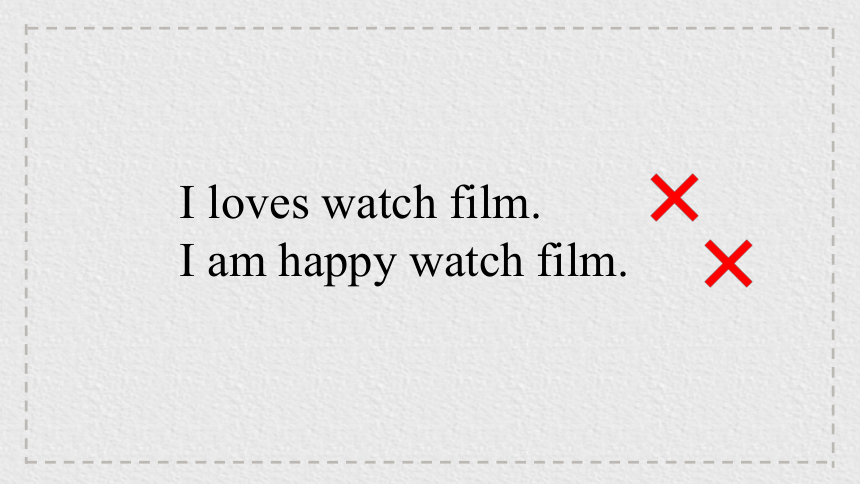
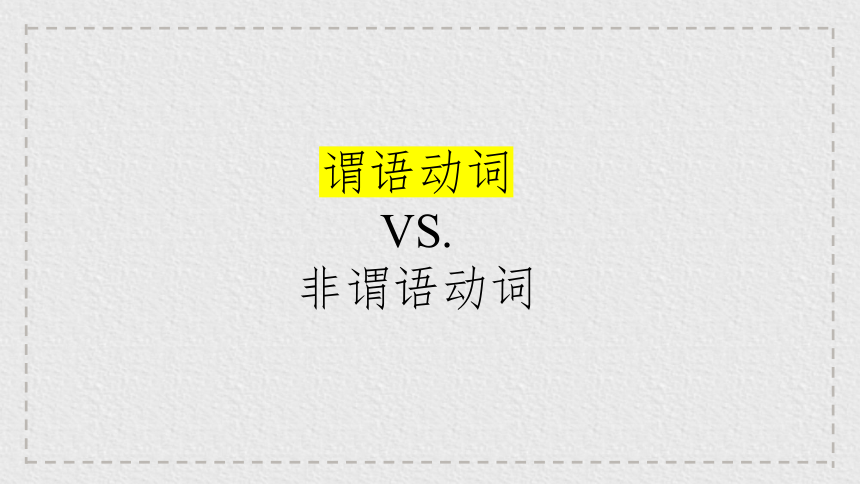
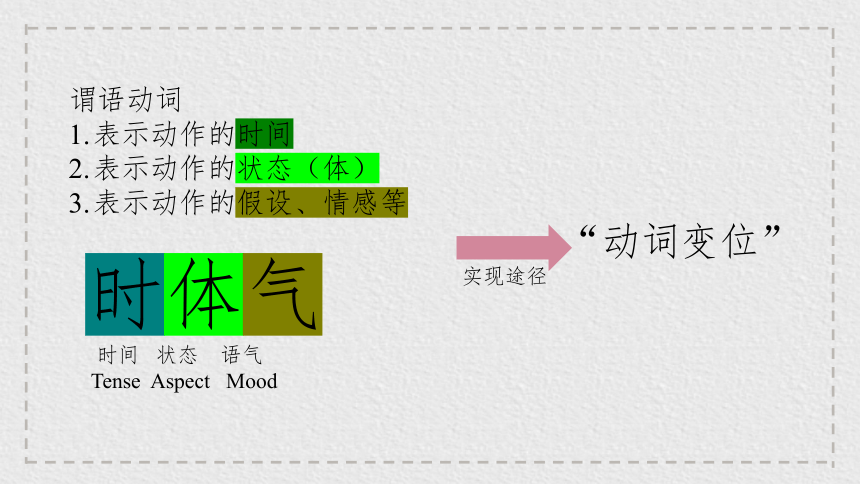
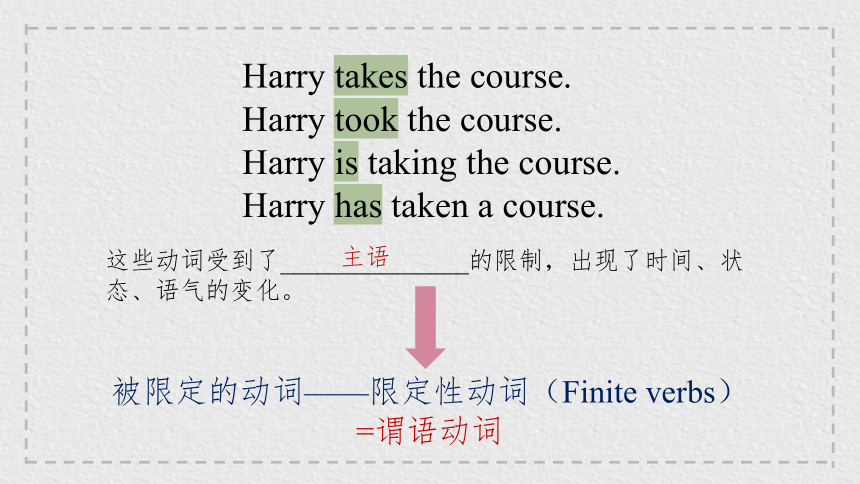

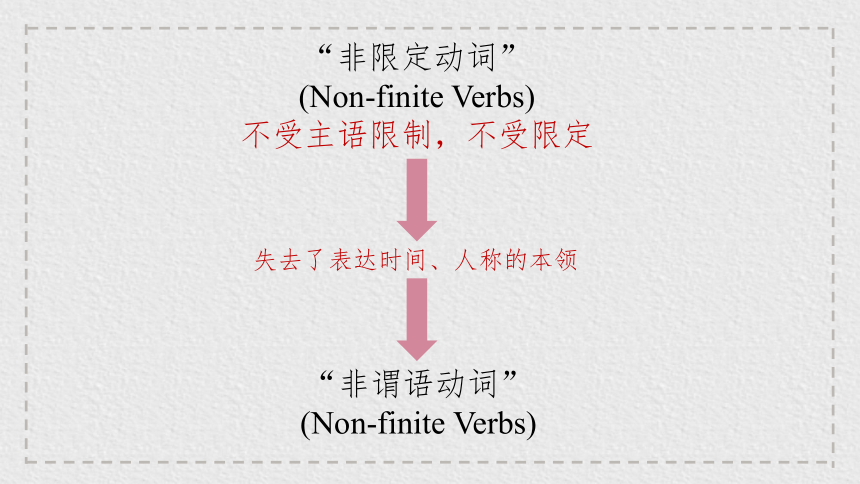

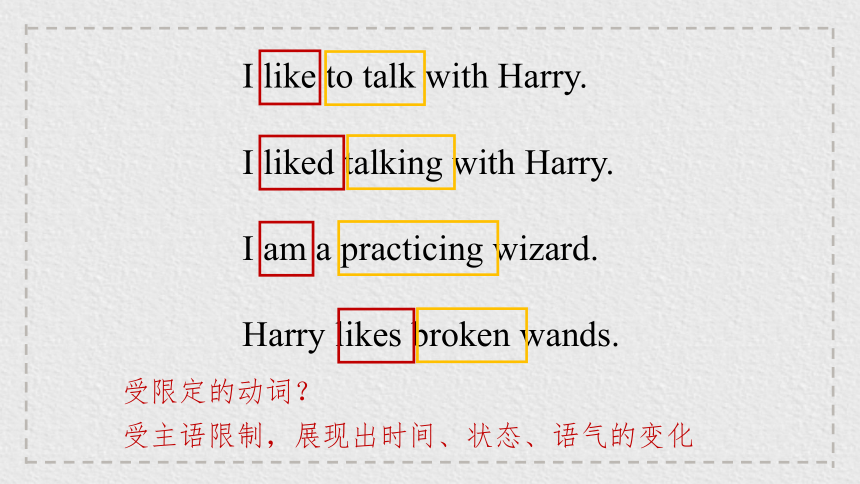
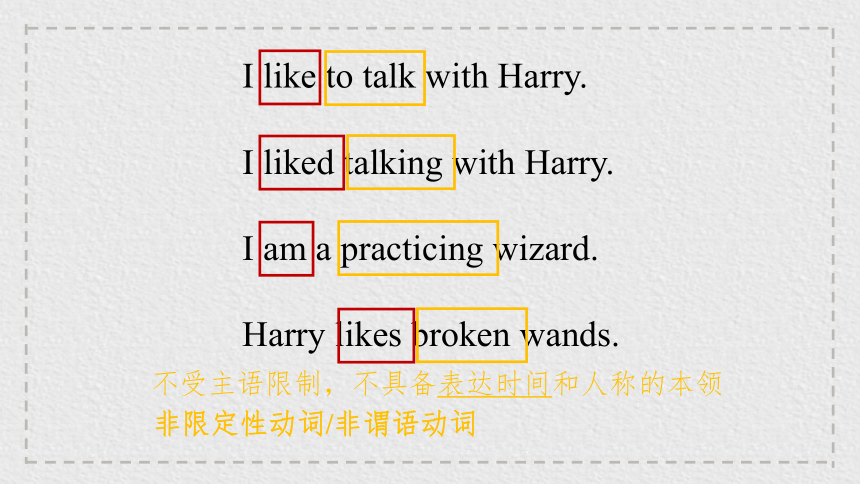
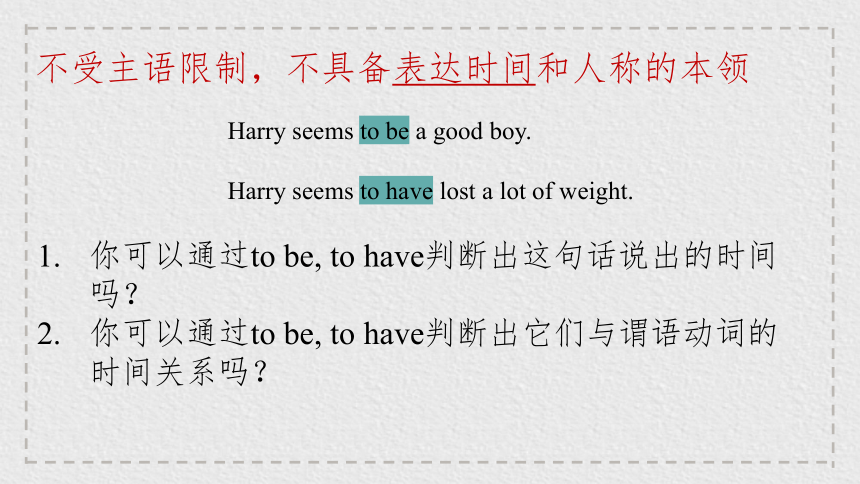
文档简介
(共174张PPT)
非谓语动词&
独立主格
我喜欢看电影。
我很高兴看电影。
I loves watch film.
I am happy watch film.
谓语动词
VS.
非谓语动词
谓语动词
表示动作的时间
表示动作的状态(体)
表示动作的假设、情感等
时体气
时间 状态 语气
Tense Aspect Mood
“动词变位”
实现途径
Harry takes the course.
Harry took the course.
Harry is taking the course.
Harry has taken a course.
这些动词受到了_______________的限制,出现了时间、状态、语气的变化。
主语
被限定的动词——限定性动词(Finite verbs)
=谓语动词
与之相对
“非限定动词”
(Non-finite Verbs)
不受主语限制,不受限定
失去了表达时间、人称的本领
“非谓语动词”
(Non-finite Verbs)
非谓语动词
动词不定式
动名词 a sleeping pill
a pill for sleeping
现在分词 a sleeping rabbit
过去分词
I like to talk with Harry.
I liked talking with Harry.
I am a practicing wizard.
Harry likes broken wands.
受限定的动词?
受主语限制,展现出时间、状态、语气的变化
I like to talk with Harry.
I liked talking with Harry.
I am a practicing wizard.
Harry likes broken wands.
不受主语限制,不具备表达时间和人称的本领
非限定性动词/非谓语动词
不受主语限制,不具备表达时间和人称的本领
你可以通过to be, to have判断出这句话说出的时间吗?
你可以通过to be, to have判断出它们与谓语动词的时间关系吗?
Harry seems to be a good boy.
Harry seems to have lost a lot of weight.
不受主语限制,不具备表达时间和人称的本领
任何动作都有时间, 只是非谓语动词相对“现在”说话时间, 不确定。
非谓语的时态,是根据和谓语动词发生时间的比较,而非说话时的时间。
非谓语动词有时态变化!!!
Harry seems to be a good boy.
Harry seems to have lost a lot of weight.
非谓语动词
动词不定式
动名词 a sleeping pill
a pill for sleeping
现在分词 a sleeping rabbit
过去分词
都有时态变化!是与谓语动词比较的先后顺序!
总结
谓语动词
非谓语动词
句子的核心
只可能出现在剩下的非核心部分中
简单句
什么怎么样
主语
谓语
谓语动词:一个简单句只能有一个
剩下的“像是动词”的动词,都不能重复表达这个概念,即非谓语动词
后宫佳丽(非谓语动词)三千 皇后(谓语动词)只有一个
为什么两个简单句不能仅仅用一个逗号连接?
I am a wizard, I study magic.
谓语动词:一个简单句只能有一个
I am a wizard, so I study magic. (连词)
两个并列的句子对应两个谓语动词。
Because I am a wizard, I study magic.
(从句+主句)
非谓语动词和谓语动词在英语句子中的角色有什么不同呢?
5种谓语动词 演化成 5种句子类型
可以独立完成的动作 主语+动词
有一个动作的承受者 主语+动词+宾语
有两个动作的承受者 主语+动词+间接宾语+直接宾语
只有一个动作的承受者(与2不同) 主语+动词+(宾语)补语
把这个词后面的信息赋予给前者 主语+动词+(主语)补语(表语)
谓语动词充当句子的核心,有时态、语气等本领。
英语句子中的其他成分呢?
主语
宾语
宾语补足语
主语补足语(即表语)
定语
状语
…
非谓语动词
一个动词,作为谓语动词,只能在句中充当核心的谓语动词,而不能充当其他句子成分。
如果想要充当其他句子成分,必须把这个动词转为非谓语动词。
主语
宾语
宾语补足语
主语补足语(即表语)
定语
状语
…
非谓语动词
非谓语动词可以作除谓语之外的任何一成分。
不定式 to do
非谓语动词
分词
动名词 doing
现在分词 doing
过去分词 done
做除了谓语动词的任何一成分
定语、状语、补语
分词只能做修饰成分
主语、宾语、表语、定语
1. 非谓语动词
——动词不定式
动词不定式
Infinitive
拉丁文:Infinitus
无限
不受时间、人称等概念限制
“非限定性动词”
Non-finite Verbs
动词不定式
infinitive
非限定动词
Non-finite
动词不定式
to+动词原形
To be or not to be, that is a question.
有时to也会省略
Hermione helps Harry study better.
动词不定式
to+动词原形
To be or not to be, that is a question.
有时to也会省略
Hermione helps Harry (to)study better.
完全不定式 Full Infinitive
裸不定式 Bare Infinitive
1.1 不定式做主语
不定式作主语
To play the Quidditch every day is good for Harry.
每天都打魁地奇这一行为
to play这个不定式可以看出:
是谁每天都打魁地奇吗?在过去打还是将来打吗?
不定式:不受具体的人和时间限制
“it”形式主语
To play the Quidditch every day is good for Harry.
It is good for Harry to play Quidditch every day.
It is + adj. + for sb. + to do sth.
主语从句
不定式做主语
It takes us an hour get there by bus.
It’s our duty help the poor.
It is a great enjoyment spend our holiday in the mountains.
It + takes(sb.)+ 时间(金钱)+ to do sth
句型 1
句型 2
It is + 名词 + to do sth
to
to
to
不定式做主语
It is easy for me to finish this work before ten.
It is + 形容词 + for sb + to do sth
句型 3
It is + 形容词 + of sb + to do sth
句型 4
It is very kind of you to give me some help.
1.2 不定式做宾语
“it”形式宾语
Harry likes to play Quidditch.
Harry considers it happy to play Quidditch every day.
1. 形式宾语
find
think
feel
make
consider
it
adj.
to do sth.
n.
四个希望两答应:hope, wish, expect, want, agree, promise
两个要求莫拒绝:demand, ask, refuse
设法学会做决定:manage, learn, decide
不要假装在选择:petend, choose
打算提出俩计划:intend, offer, plan, mean
申请失败负担起:apply, fail, afford
准备愿望又碰巧:prepare, desire, happen
2. 及物动词之后
My dog that has spots is missing.
3. 疑问词+不定式
The problem is
where to find it.
I hope you’ll advise me what to do.
1.3 不定式做宾语补语
Professor Dumbledore expects Harry to defeat Voldemort.
1. 不定式可以和复杂及物动词一起使用。
like(喜欢),allow(允许), ask (要求),wish(希望), order(命令),invite(邀请),tell(告诉),require (要求),want(想要), force(逼迫),advise (建议),warn (警告),beg (祈求),teach(教),permit(允许),persuade(说服),encourage(鼓励),forbid(禁止),get(使),wait for(等待)等
see
find
watch
hear
feel
notice
have
make….
sb.
省略to
do
2. 有些谓语动词后接不定式做宾补需要省略to。
3. 谓语动词后接不定式做宾补时,省略不省略to,区别不大。
Professor Dumbledore helps Harry to study magic.
Professor Dumbledore helps Harry study magic.
这类动词转为被动语态时其后的不定式要加上 to
牛刀小试
I’ll get someone ______(repair) the recorder.
What caused him ______ (change) his mind
He asked me ______ (do) the work with him.
to repair
to change
to do
4. there be+不定式 常见动词:believe, expect, like, prefer, want
Harry doesn’t want there to be any more trouble.
1.3 不定式做定语
不定式做定语
Harry has a lot of homework to do.
动宾关系
The next train to leave is from Platform 9-3/4.
当名词有序数词、最高级或the last/only/next等修饰时(不定式和被修饰词构成主谓关系)
不定式做定语
Harry needs some paper to write a letter on.
当不定式动词为vi.,需要加上必要的介词(不定式和被修饰词构成动宾关系)
The ability to understand others is important.
作定语的不定式可以说明所修饰的名词或代词的内容(不定式和被修饰的词构成同位关系)
不定式做定语
1.4 不定式做状语
表原因
I was surprised to get a prize.
我很震惊(因为)得到一个奖。
相当于“原因状语从句”
I was surprised because I got a prize.
我很震惊,因为我得到了一个奖。
不定式表示原因时,一般放在情感形容词的后面。
表目的
I will do anything to get a prize.
我为了得到一个奖会做任何事。
相当于“目的状语从句”
I will do anything in order that I get a prize.
为了奖,我能做出任何事。
不定式表示目的时,常可同in order to,so as to换用。
表结果
I get a prize to travel around the world.
我得到了一个奖,可以环游世界啦。
相当于“结果状语从句”
I get a prize, so that I travel around the world.
我得到了一个奖,于是我环游了世界。
表示预料之外的结果,不定式前常带有only, never等
像不定式这样的非谓语动词还有简化从句的作用。
1.5 不定式做表语
Harry’s duty is to defeat Voldemort.
不定式作表语,可以位于seem,appear之后,句子主语可以是duty, job, aim, purpose, plan, wish, choice, purpose, intention, decision等抽象名词。
What is hard is to defeat Voldemort.
主语为what, all(that)引导的主语从句,表语可以用不定式。
Harry is to be a hero.
如果主语是人,不定式作表语表示将来,有“即将”之意。
To save is to produce.
主语为不定式表示条件,表语也为不定式,表示结果或目的。
1.6 不定式的时态和语态
高级不定式
不定式的时态和语态变化
1.5.1 to do
to do
I hope to lose a lot of weight.
我希望能掉很多肉肉。
to lose 发生在hope之后
to do
I often see Jane run in the gym.
我希望能掉很多肉肉。
see和run一起发生
Form Meaning Passive form
to do 表示动作发生在谓语动词之后 表示动作与谓语动词同时发生 to be done
1.5.2 to have done
to have done
I seem to have lost a lot of weight.
我好像掉了很多肉肉。
在 “我” 说话之前
好像掉了很多肉肉
与seem的时间点相比,
已经lose了
to have done
I planned to have worn my jeans today,
but I wore my mom’s.
我本来打算穿自己的牛仔裤,
结果穿成妈妈的了。
之前计划做,但实际没有做
Form Meaning Passive form
to have done 说话前已完成,常用在think, claim, believe 等词后面 本打算做,但没有做成 to have been done
1.5.3 to be doing
to be doing
He seemed to be walking his dog.
他看上去正在遛狗。
walk这个动作与seemed同时发生
to be doing
I want to be watching him all the time.
我想一直能看着他。
“一直看着” 强调
动作的持续性
to be doing
form meaning passive form
to be doing 1. 表示动作与谓语动词表示的动作同时发生 2. 当要用不定式to do的结构时,为了强调持续性或者进行中 无
1.5.4 to have been doing
to have been doing
He seemed to have been walking his dog.
他看上去好像一直在溜他的狗。
walk这个动作与seem相比,
过去一直在持续发生
to have been doing
form meaning passive form
to have been doing 表示在谓语动词动作之前一直在进行的动作。 无
牛刀小试
Lots of rescue workers were working around the clock, ______ supplies to Yushu after the earthquakes.
01
sending
to send
having sent
to have sent
牛刀小试
(2017·北京卷)
_______the project in time, the staff were working at weekends.
01
Competing
Having completed
To have completed
To complete
牛刀小试
The play ________ next month aims mainly to reflect the local culture.
03
being produced
having been produced
to be produced
produced
不定式 to do
非谓语动词
分词
动名词 doing
现在分词 doing
过去分词 done
做除了谓语动词的任何一成分
定语、状语、补语
分词只能做修饰成分
主语、宾语、表语、定语
2. 非谓语动词
——动名词
动名词
动词+ing
名词
2.1 动名词做主语
Professor Dumbledore is important to Harry Potter.
Meeting Professor Dumbledore is important to Harry Potter.
不定式作主语 VS 动名词作主语
区别:
不定式:表示某一具体的动作
动名词:表示比较抽象概念的一般行为倾向
动名词作主语常放于句首
不定式作主语常放于句末;用it作形式主语放在句首
Smoking is prohibited here. (抽象)
It is not very good for you to smoke so much. (具体)
2.2 动名词做主语补语
(表语)
Harry’s hobby is playing Quidditch.
Seeing is believing.
眼见为实
1.3 动名词做定语
an apple tree
a sleeping pill
2.3 动名词做宾语
Harry likes to play Quidditch.
Harry likes playing Quidditch.
动词后只可以加doing作宾语,不可以加to do的有
avoid
advise
consider
escape
mind
practice
insist on
give up
feel like
put off
介词+宾语
非谓语动词
动名词
Harry is fond of playing Quidditch.
Harry looks forward to playing Quidditch.
不定式作宾语 VS 动名词作宾语
1. 下面的动词要求用不定式作宾语:
attempt(企图), afford(负担得起), demand(要求), long(渴望), desire(渴望), expect, hope, wish, want, swear(发誓), volunteer(自愿), offer(提供), fail(未能), plan, care(关心, 喜欢), happen(碰巧), prepare(准备), learn(学习), choose(选择), hesitate(犹豫), claim(要求), promise, undertake(承接), appear(似乎), seek(寻觅), refuse(拒绝), decide(决定), determine(决定), manage(设法), pretend(假装), agree(同意), bother(烦恼), intend(想要), wait(等待)
2. 下面的动词只能用动名词作宾语:
acknowledge(承认), admit(承认), deny(否认), mention(说到, 讲到), tolerate/stand/bear(忍受), dislike(不喜欢), advocate(提倡, 主张), appreciate(感激, 欣赏), avoid(避免), enjoy(享受), envy(嫉妒), delay(延迟), postpone(延迟, 延期), escape(逃跑, 逃避), excuse/pardon/forgive(原谅), fancy(幻想, 爱好), imagine(想象), favour(造成, 偏爱), mind(介意), miss(错过), finish(完成), resist(抵抗), risk(冒险), involve(包含), practise(实践), suggest/advise/recommend(建议), prevent(阻止), keep(保持), quit/abandon(放弃, 停止), understand(理解), include(包括)
3. 后接动名词作宾语的动词短语和句型有:
have(no/much/some/...) difficulty/trouble/a hard time(in),
take pleasure in,
spend time/money (in),
waste time(in),
be worth,
be busy,
feel like,
be committed to
4. to作为介词的短语有:
look forward to,
pay attention to,
object to=be opposed to,
be devoted to,
stick to,
come close to(差一点),
get down to(开始认真做),
get/be accustomed/used to(doing),
lead to=contribute to(sb. doing/being done)
5. allow, permit, forbid, advise, recommend的用法:
allow/permit/forbid/advise/recommend+doing
allow/permit/forbid/advise/recommend+sb.+to do
如:
I don't allow smoking in my room.
I don't allow him to smoke in my room.
6.既可以接-ing又可以接-to do, 但意义有差别的动词
①forget to do sth. 忘记要去做某事(此事未做)
forget doing sth. 忘记做过某事(此事已做过或已发生)
remember to do sth. 记得去做某事(未做)
remember doing sth. 记得做过某事(已做)
②stop to do 停止(某件事), 目的是去做另一件事
stop doing 停止正在或经常做事
go on to do 继续(去做另外一件事情)
go on doing 继续(原先没有做完的事情)
6.既可以接-ing又可以接-to do, 但意义有差别的动词
③regret to do sth. 对要做的事感到遗憾(遗憾地要去做某事)
regret doing sth. 对过去做过的事或未做过的事感到后悔(后悔做过或未做过某事)
④try to do 努力、企图做
try doing 试验、试一试某种办法
⑤mean to do (人)打算, 有意要……
mean doing (物)意味着
⑥can't help (to) do sth. 不能帮助做某事
can't help doing sth. 情不自禁做某事
语法填空
根据其前介词for可知,此处用动名词形式作宾语,故填being。
1.【2019·新课标II卷】A 90-year-old has been awarded“Woman Of The Year”for ___61___ (be)Britain's oldest full-time employee-still working 40 hours a week.
语法填空
句意:但是,有一些学生不想穿学生服。want to do sth想要做某事,这里是动词不定式作to的宾语。故填to wear。
2.【2019·浙江卷】But some students didn't want ___63___ (wear) the uniform.
语法填空
此处指我记得去拜访一个在这里住了五年的朋友,表示记得做过某事用remember doing sth., 故填visiting。
3.【2018·浙江卷】I still remember 59 (visit) a friend who’d lived here for five years and I was shocked (shock) when I learnt she hadn’t cooked once in all that time.
语法填空
64.考查动词。动词avoid后要加doing。此处表示避免直接看他的眼睛。用looking。
65.考查非谓语。根据语境可知,此处表示不直视他的眼睛,他就不会感到被挑战性。feel为系动词,表示“被挑战”,用过去分词challenged。
4.【2018·新课标III卷】I quickly lower myself, ducking my head to avoid ____64____(look) directly into his eyes so he doesn't feel____65____(challenge).
语法填空
句意:他们的答案也表明他们不喜欢和其他人说。固定短语dislike doing sth.,意为“不喜欢做某事”,doing为动名词作宾语。故talk改为talking。
5.(2021年全国甲卷短文改错) ….. Their answers also show that they dislike ______ (talk)to others……...
语法填空
句意:我不打算吃任何东西,但冰淇淋看起来如此的好以至于我忍不住的要试一试。固定短语短语mean to do(打算做),couldn’t help doing忍不住做。故选D。
6.【2018·天津】I didn't mean __________(eat) anything but the ice cream looked so good that I couldn’t help_______(try) it.
不定式 to do
非谓语动词
分词
动名词 doing
现在分词 doing
过去分词 done
做除了谓语动词的任何一成分
定语、状语、补语
分词只能做修饰成分
主语、宾语、表语、定语
3. 非谓语动词
——现在分词
现在分词
现在进行时=be+现在分词
a talking rabbit
一只说话的兔子
无“表达时间”的能力,但有“形容词”的属性
现在分词作定语
动名词作定语
a sleeping rabbit
一直睡觉的兔子
a sleeping pill
一片安眠药
sleeping相当于“名词”,a pill for sleeping
说明pill的性质、功能和用途
sleeping“在睡觉的”,不是名词,相当于“形容词”
用来修饰兔子的状态
3.1 现在分词做表语
(主语补语)
Harry is charming.
The story is interesting.
The game is exciting.
The news is encouraging.
interest
excite
encourage
3.2 现在分词做宾语补足语
现在分词作宾语补足语
Harry saw the rabbit eating a carrot.
哈利之前看到兔子正在吃一只胡萝卜。
不定式作宾语补足语
Harry saw the rabbit eat a rabbit.
哈利之前看到兔子吃了根胡萝卜。
表示一个动作自始至终的过程,强调动作已经发生了
表示动作正在进行中,强调动作进行的状态
3.3 现在分词做状语
现在分词作状语表示时间、原因、条件、结果、让步、目的、方式和伴随情况等。
Hearing the news, Harry became excited.
听到这个消息,Harry很激动。
When he heard the news, Harry became excited.
听到这个消息时,Harry很激动。
现在分词作状语表示时间、原因、条件、结果、让步、目的、方式和伴随情况等。
Not knowing what to eat, Harry skipped the lunch.
不知道吃什么,哈利没吃中饭。
Because he didn’t know what to eat, Harry skipped the lunch.
因为他不知道吃什么,哈利没吃中饭。
3.4 现在分词的时态和语态
现在分词完成态
Having worn my Long Johns, I felt warm then.
穿了秋裤,我觉得很暖和。
先 “穿好” 秋裤
后 “感到” 暖和
现在分词完成态
Having been kept in the fridge for 2 weeks,
the food has gone bad.
食物被放在冰箱里两周后,坏了。
先 “被存放” 在冰箱里,后 “坏了”
非谓语动词 时态 主动 被动 意义
现在分词 动名词 一般式 doing being done 与谓语动词的动作同时发生
或基本上同时发生
完成式 having done having been done 在谓语动词的动作之前
不定式 to do
非谓语动词
分词
动名词 doing
现在分词 doing
过去分词 done
做除了谓语动词的任何一成分
定语、状语、补语
分词只能做修饰成分
主语、宾语、表语、定语
4. 非谓语动词
——过去分词
过去分词不能表示过去的时间。
minced meat
绞肉
minced onion
绞洋葱
Harry will eat minced meat next week.
4.1 过去分词作定语
minced meat
绞肉
a painted room
一个漆过了的房间
an excited person
一个激动的人
过去分词作定语
The cake eaten by Harry is delicious.
被哈利吃了的蛋糕很美味。
过去分词短语作定语,要放到被修饰的名词之后
“后置定语”
不定式作定语VS动名词作定语VS现在分词作定语VS过去分词作定语
不定式作定语 必须后置,表示将要发生的动作
动名词作定语 相当于“名词”,放在被修饰名词之前,表示被修饰词的功能、性质和用途
分词作定语 相当于“形容词”,表示被修饰词的状态
分词作定语,若是单个的分词,通常置于被修饰名词之前,若是分词短语作定语则要置于被修饰名词之后,其功能相当于定语从句
现在分词作定语 现在分词作定语表主动关系、表动作正在进行
过去分词作定语 过去分词作定语表被动关系、表示动作已完成
分词作定语
语法填空
句意:中国的国道318号,从上海到西藏樟木,延伸出5000多公里,因为它的令人赞叹的景观,被熟知为“天堂之路”。分析句子成分可知,is known as是整个句子的谓语动词,所以空格处应填非谓语动词,extend与主语China's National Highway 318之间的关系为主动,所以用extending。
1.【2021·天津卷】China's National Highway 318, ________(extend) over 5,000 kilometers from Shanghai to Zhangmu, Tibet, is known as the "heavenly road“ for its amazing views.
语法填空
句意:Jim已经退休了,但是他依然记得和学生一起度过的快乐时光。句子已经有了谓语,空格只能填非谓语动词,逻辑主语是time,和spend之间是被动关系,故用过去分词spent。
2.【2017·北京卷】Jim has retired, but he still remember the happy time _______ ( spend )with his students.
语法填空
此处用to do sth做后置定语,用来修饰前面的名词plan,表示“……的计划”,故填to retire。
3.【2019·新课标II卷】Picking up her “Lifetime Achievement” award,proud Irene ___declared__(declare) she had no plans ___65___ (retire) from her 36-year-old business.
语法填空
根据其后所接的宾语从句可知,此处用现在分词形式saying作后置定语,解释名词call的内容,call与say是主动关系,故填saying。
4.【2019·新课标II卷】When we got a call ___68___ (say)she was short-listed,we thought it was ___a__ joke.
语法填空
句意:它们代表着大地的复苏和对新开端的美好祝愿。句中谓语动词为represent,所以这里为非谓语动词。名词earth与come back to之间为主动关系,所以用现在分词作后置定语。故填coming。
5.【2020·新课标II卷】They represent the earth 63. (come) back to life and best wishes for new beginnings.
语法填空
句意:研究发现,1985年至2017年间,农村女性和男性的平均BMI增加了2.1。increase by表示“增加了”;increase to表示“增加到”。根据正常的成人BMI数值(18.5-23.9)可知,increase by符合语境,故填by。
6. The study found that between 1985 and 2017, average rural BMI increased 32. 2. 1 in women and men.
语法填空
句意:然而,在城市中,女性增加了1.3,男性增加了1.6。分析句子结构可知,句子缺少谓语,主语(gain)是单数,时态是一般过去时,故填was。
7. In cities, however, the gain 33. (be) 1. 3 in women and 1. 6 in men. The researchers described “striking changes” in the geography of BMI.
语法填空
句意:1985年,在被研究的国家中,超过四分之三的城市男性和女性的BMIs高于农村地区的男性和女性。分析句子结构可知,句子的谓语是had,所以study用非谓语形式,它的逻辑主语是countries,表被动关系,故填studied。
8. In 1985,urban men and women in more than three quarters of the countries 34. (study) had higher BMIs than men and women in rural areas.
语法填空
句意:但30年后,许多国家城市和农村人口的BMI差异大幅缩小。分析句子结构可知,sharp是要修饰动词narrow,用sharp的副词形式sharply。故填sharply。
9. But 30 years later, the BMI difference between urban and rural people in many countries had narrowed 35. (sharp).
语法填空
句意:这可能是由于生活在农村的人有一些不利条件,包括较低的收入和教育水平,较高的健康食品成本,以及较少的体育设施。分析句子结构可知,句子已有谓语动词may be,故live用非谓语形式,它的逻辑主语是people,表主动关系,做定语,用现在分词形式,故填living。
10. This may be due to some disadvantages for people 36. (live) in the countryside, including lower levels of income and education, higher costs of healthy foods, and fewer sports facilities.
语法填空
句意:我喜欢吃西红柿炒鸡蛋。动词fry与tomatoes之间是动宾关系,所以此处应用过去分词作定语,故填fried。
11. (2020·新课标I卷)I like eating _______(fry) tomatoes with eggs, and I thought it must to be easy to cook.
4.2 过去分词作主语补语
(表语)
Harry is interested in playing Quidditch.
哈利对打魁地奇感兴趣。
过去分词作主语补语(表语)
现在分词作主语补语(表语)
The story is interesting.
故事很有趣。
Harry was frightened.
哈利感到害怕。(被动害怕)
Harry was frightening.
哈利令人感到害怕。(主动吓人)
不定式作表语VS动名词作表语VS现在分词作表语VS过去分词作表语
不定式作表语 1. 表示将来的动作;2. 表示目的
动名词作表语 表示抽象概念,如“身份、职业”
My job is teaching.
分词作表语 surprise, interest, excite, puzzle等及物动词作表语时,要看其与主语的关系:
主动:现在分词
被动:过去分词
4.3 过去分词作宾语补语
Harry found his wand stolen.
哈利发现他的魔杖被偷了。
不定式作宾补VS现在分词作宾补VS过去分词作宾补
不定式作宾补 带to的不定式作宾补的动词:ask, invite, tell, want, wish…
不带to的不定式作宾补的动词:feel, listen to, let, make, have 等
表示某人做某事的全过程或某事发生的全过程,强调事物的发生和结束
现在分词作宾补 表示动作的过程,即动作正在进行,尚未结束。宾语和宾补之间是主动关系。
过去分词作宾补 着重动作完成,表明动作的结果,宾语和宾补之间是被动关系。
感官动词(see, watch, notice, observe, look at 五看hear/listen to 二听feel一感smell一闻)+sb./sth. doing/done/do
When we got to school, we saw the gate locked.
I saw Linda whispering to Danny. (强调动作正在进行)
I saw Linda whisper to Danny.(强调动作的全过程)
2. 使役动词make sb. do sth./make sth. done
get sb. doing sth./to do sth.; get sth. done
have sb. do sth. (强调过程) have sb. doing sth. (强调正在进行)
have sth. done
have/get+宾语+动词-ed结构时:A. 某事被做 B.遭遇某种不幸
keep/leave/find sb./sth. doing/done
set/catch sb. doing
with+宾语+doing/done
4.4 过去分词作状语
表地点
Seen from the hill, the castle looks beautiful.
表原因
Born in a rich family, Harry has a lot of money.
表条件
Given another chance, Harry would go to the party.
过去分词和现在分词的选择,仍然是看其与逻辑主语之间的主被动关系。
The course finished, Harry played Quidditch.
课程结束后,哈利打魁地奇去了。
The work was finished, and/so Harry played Quidditch.
After the work was finished, Harry played Quidditch.
该用法:让并列句、从句中只含有一个谓语动词,其他的变成非谓语动词,用一个简单句写出来。
不定式作状语VS现在分词作状语VS过去分词作状语
不定式作状语 作目的状语
作结果状语,表示出乎意料的结果,经常与only连用
作原因状语
形容词或过去分词作表语时,后接不定式表原因状语(happy, sorry)
分词作状语 表时间、原因、条件、结果、方式或伴随、让步等。
having done (与句中主语是逻辑上的主动关系现在分词的动作先于谓语动词)
having been done (与句中主语是逻辑上的被动关系,且先于谓语动词发生)
done (与句中主语是逻辑上的被动关系)
doing (与句中主语是逻辑上的主动关系)
(1)为了使分词作状语表达的意思更加明确,可在其前面加上适当的连词:when, while, once, if, though, unless, even等。
When waiting for the bus, he saw an old friend.
Once losing the chance, you can’t easily find it.
(2) 独立成分:有些分词短语可以做独立成分,用来解释整个句子,不需要与句子主语构成主动关系。
Generally/frankly/honestly/briefly…speaking, talking of, seeing that, considering that, judging from/by
The weather permitting, Harry will play Quidditch.
天气允许的话,哈利会去打魁地奇。
If the weather permits, Harry will play Quidditch.
独立主格
一个简单句除去核心的谓语动词外,其他的动词转化为对应的过去分词或现在分词的用法。
The course finished, Harry played Quidditch.
课程结束后,哈利打魁地奇去了。
The weather permitting, Harry will play Quidditch.
天气允许的话,哈利会去打魁地奇。
现在分词/过去分词存在于句中的状语里(并非句子的主语里)。但在状语本身里,分词修饰的对象(course和weather)隐藏了一层“主语”的意味,但并不是主句的主语。
5. 总结
非谓语动词 时态 主动 被动 意义 可做成分
不定式 一般式 to do to be done 与谓语动词的动作同时发生 或在其后发生 做除了谓语动词的任何一成分
进行式 to be doing 与谓语动词的动作同时发生 完成式 to have done to have been done 在谓语动词的动作之前 现在分词 动名词 一般式 doing being done 与谓语动词的动作同时发生 或基本上同时发生 定语、状语、补语(修饰成分)
完成式 having done having been done 在谓语动词的动作之前 过去分词 done 与主语为逻辑上的被动关系 或表完成
特殊情况——主动表被动
(1) 不定式to blame, to let用作表语时,通常要用主动形式表示被动意义: Who is to blame 该怪谁呢 The house is to let. 此屋出租。
(2) 某些“be+形容词+to do”结构中的不定式通常要用主动形式表示被动意义:
The question is difficult to answer. 这问题很难回答。
Your writing is impossible to read. 你的书写没法认。
这类形容词常见的有awkward, convenient, dangerous, difficult, easy, hard, impossible, interesting, nice, pleasant, safe, tough, tricky, unpleasant 等。
有时形容词后跟有名词,在名词后用作定语的不定式用主动形式表示被动意义: It’s a difficult book to read. 那是一本难读的书。 It is a pleasant thing to remember. 这是一件值得记住的愉快的事。
特殊情况——主动表被动
有少数用于类似结构的形容词(如fit, ready, free等),其中的不定式用主动式和被动式均可: The water is not fit to drink [to be drunk]. 这水不适合饮用。
(3) 不定式用于某些动词(如have, have got, get, want, need等)的宾语后作定语时,如果不定式的逻辑主语就是句子的主语,则要用主动形式表示被动意义: I have some letters to write. 我有一些信要写。
如果不定式的逻辑主语不是句子的主语,则应用被动式,比较:
I have something to type. 我有些东西要打(字)。(指自己打字)
I have something to be typed. 我有些东西要打(字)。(指请人打字)
特殊情况——主动表被动
(4) 不定式用于某些双宾动词(如give, show, buy, lend, get等)的直接宾语后作定语时。
如果不定式的逻辑主语就是直接宾语前的间接宾语,通常用主动形式表示被动意义:
Give me some magazines to read. 给我几本杂志看。
如果不定式的逻辑主语不是直接宾语前的间接宾语,则应用被动式:He will show you the room to be used as the meeting-room. 他将带你去看看用作会议室的房间。
特殊情况——主动表被动
(5) be worth后的动名词要用主动表被动:
In all, the book is worth reading. 总之,这本书值得一读。
This might be worth thinking about. 这可能值得考虑。
与worth相似的worthy却不一样,其后不接动名词而接不定式(若接动名词则其前应有介词of),且要用被动式表示被动含义: This book is worthy to be read [of being read]. 这本书值得一读。
特殊情况——主动表被动
(6) 在need, want, require等少数表示“需要”的动词后的动名词用主动形式表被动意义: The plants want watering every day. 这些花草得天天浇水。
以上结构中的动名词改用不定式则要用被动式表示被动意义:
This sentence needs explaining [to be explained]. 这个句子需要解释。
它们后接名词时也可表示被动意义: It needs no explanation. 它无需解释。 This plan requires careful consideration. 这项计划需要仔细考虑。`
语法填空
1. (2014 福建) ______________ (spend) the past year as an exchange student in Hong Kong, Linda appears more mature than those of her age.
2. ______________ (frighten) by the news, he felt dizzy.
3. ____________________ (tend) for half a year, my granny became far better.
Having spent
Frightened
Having been tended
语法填空
4. ______________ (lead) by the local guide, they had no difficulty reaching the destination.
5. I planned ______________ (study) hard, but I didn't.
6. (2015 天津) ______________ (work) for two days, Steve managed to finish his report on schedule.
Led
to have studied
Having worked
语法填空
1. Have a rest now. You seem _____________ (work) all the morning.
2. (2015 福建) In recent years an English word “infosphere” has appeared, _____________ (combine) the sense of “information” and “atmosphere”.
to be working
combining
语法填空
3. The room is too quiet. The baby seems _____________ do) something strange.
4. _____________ (expose) to alcohol, whether for an adult or for a teenager, is definitely harmful from all aspects.
to be doing
Being exposed
非谓语动词&
独立主格
我喜欢看电影。
我很高兴看电影。
I loves watch film.
I am happy watch film.
谓语动词
VS.
非谓语动词
谓语动词
表示动作的时间
表示动作的状态(体)
表示动作的假设、情感等
时体气
时间 状态 语气
Tense Aspect Mood
“动词变位”
实现途径
Harry takes the course.
Harry took the course.
Harry is taking the course.
Harry has taken a course.
这些动词受到了_______________的限制,出现了时间、状态、语气的变化。
主语
被限定的动词——限定性动词(Finite verbs)
=谓语动词
与之相对
“非限定动词”
(Non-finite Verbs)
不受主语限制,不受限定
失去了表达时间、人称的本领
“非谓语动词”
(Non-finite Verbs)
非谓语动词
动词不定式
动名词 a sleeping pill
a pill for sleeping
现在分词 a sleeping rabbit
过去分词
I like to talk with Harry.
I liked talking with Harry.
I am a practicing wizard.
Harry likes broken wands.
受限定的动词?
受主语限制,展现出时间、状态、语气的变化
I like to talk with Harry.
I liked talking with Harry.
I am a practicing wizard.
Harry likes broken wands.
不受主语限制,不具备表达时间和人称的本领
非限定性动词/非谓语动词
不受主语限制,不具备表达时间和人称的本领
你可以通过to be, to have判断出这句话说出的时间吗?
你可以通过to be, to have判断出它们与谓语动词的时间关系吗?
Harry seems to be a good boy.
Harry seems to have lost a lot of weight.
不受主语限制,不具备表达时间和人称的本领
任何动作都有时间, 只是非谓语动词相对“现在”说话时间, 不确定。
非谓语的时态,是根据和谓语动词发生时间的比较,而非说话时的时间。
非谓语动词有时态变化!!!
Harry seems to be a good boy.
Harry seems to have lost a lot of weight.
非谓语动词
动词不定式
动名词 a sleeping pill
a pill for sleeping
现在分词 a sleeping rabbit
过去分词
都有时态变化!是与谓语动词比较的先后顺序!
总结
谓语动词
非谓语动词
句子的核心
只可能出现在剩下的非核心部分中
简单句
什么怎么样
主语
谓语
谓语动词:一个简单句只能有一个
剩下的“像是动词”的动词,都不能重复表达这个概念,即非谓语动词
后宫佳丽(非谓语动词)三千 皇后(谓语动词)只有一个
为什么两个简单句不能仅仅用一个逗号连接?
I am a wizard, I study magic.
谓语动词:一个简单句只能有一个
I am a wizard, so I study magic. (连词)
两个并列的句子对应两个谓语动词。
Because I am a wizard, I study magic.
(从句+主句)
非谓语动词和谓语动词在英语句子中的角色有什么不同呢?
5种谓语动词 演化成 5种句子类型
可以独立完成的动作 主语+动词
有一个动作的承受者 主语+动词+宾语
有两个动作的承受者 主语+动词+间接宾语+直接宾语
只有一个动作的承受者(与2不同) 主语+动词+(宾语)补语
把这个词后面的信息赋予给前者 主语+动词+(主语)补语(表语)
谓语动词充当句子的核心,有时态、语气等本领。
英语句子中的其他成分呢?
主语
宾语
宾语补足语
主语补足语(即表语)
定语
状语
…
非谓语动词
一个动词,作为谓语动词,只能在句中充当核心的谓语动词,而不能充当其他句子成分。
如果想要充当其他句子成分,必须把这个动词转为非谓语动词。
主语
宾语
宾语补足语
主语补足语(即表语)
定语
状语
…
非谓语动词
非谓语动词可以作除谓语之外的任何一成分。
不定式 to do
非谓语动词
分词
动名词 doing
现在分词 doing
过去分词 done
做除了谓语动词的任何一成分
定语、状语、补语
分词只能做修饰成分
主语、宾语、表语、定语
1. 非谓语动词
——动词不定式
动词不定式
Infinitive
拉丁文:Infinitus
无限
不受时间、人称等概念限制
“非限定性动词”
Non-finite Verbs
动词不定式
infinitive
非限定动词
Non-finite
动词不定式
to+动词原形
To be or not to be, that is a question.
有时to也会省略
Hermione helps Harry study better.
动词不定式
to+动词原形
To be or not to be, that is a question.
有时to也会省略
Hermione helps Harry (to)study better.
完全不定式 Full Infinitive
裸不定式 Bare Infinitive
1.1 不定式做主语
不定式作主语
To play the Quidditch every day is good for Harry.
每天都打魁地奇这一行为
to play这个不定式可以看出:
是谁每天都打魁地奇吗?在过去打还是将来打吗?
不定式:不受具体的人和时间限制
“it”形式主语
To play the Quidditch every day is good for Harry.
It is good for Harry to play Quidditch every day.
It is + adj. + for sb. + to do sth.
主语从句
不定式做主语
It takes us an hour get there by bus.
It’s our duty help the poor.
It is a great enjoyment spend our holiday in the mountains.
It + takes(sb.)+ 时间(金钱)+ to do sth
句型 1
句型 2
It is + 名词 + to do sth
to
to
to
不定式做主语
It is easy for me to finish this work before ten.
It is + 形容词 + for sb + to do sth
句型 3
It is + 形容词 + of sb + to do sth
句型 4
It is very kind of you to give me some help.
1.2 不定式做宾语
“it”形式宾语
Harry likes to play Quidditch.
Harry considers it happy to play Quidditch every day.
1. 形式宾语
find
think
feel
make
consider
it
adj.
to do sth.
n.
四个希望两答应:hope, wish, expect, want, agree, promise
两个要求莫拒绝:demand, ask, refuse
设法学会做决定:manage, learn, decide
不要假装在选择:petend, choose
打算提出俩计划:intend, offer, plan, mean
申请失败负担起:apply, fail, afford
准备愿望又碰巧:prepare, desire, happen
2. 及物动词之后
My dog that has spots is missing.
3. 疑问词+不定式
The problem is
where to find it.
I hope you’ll advise me what to do.
1.3 不定式做宾语补语
Professor Dumbledore expects Harry to defeat Voldemort.
1. 不定式可以和复杂及物动词一起使用。
like(喜欢),allow(允许), ask (要求),wish(希望), order(命令),invite(邀请),tell(告诉),require (要求),want(想要), force(逼迫),advise (建议),warn (警告),beg (祈求),teach(教),permit(允许),persuade(说服),encourage(鼓励),forbid(禁止),get(使),wait for(等待)等
see
find
watch
hear
feel
notice
have
make….
sb.
省略to
do
2. 有些谓语动词后接不定式做宾补需要省略to。
3. 谓语动词后接不定式做宾补时,省略不省略to,区别不大。
Professor Dumbledore helps Harry to study magic.
Professor Dumbledore helps Harry study magic.
这类动词转为被动语态时其后的不定式要加上 to
牛刀小试
I’ll get someone ______(repair) the recorder.
What caused him ______ (change) his mind
He asked me ______ (do) the work with him.
to repair
to change
to do
4. there be+不定式 常见动词:believe, expect, like, prefer, want
Harry doesn’t want there to be any more trouble.
1.3 不定式做定语
不定式做定语
Harry has a lot of homework to do.
动宾关系
The next train to leave is from Platform 9-3/4.
当名词有序数词、最高级或the last/only/next等修饰时(不定式和被修饰词构成主谓关系)
不定式做定语
Harry needs some paper to write a letter on.
当不定式动词为vi.,需要加上必要的介词(不定式和被修饰词构成动宾关系)
The ability to understand others is important.
作定语的不定式可以说明所修饰的名词或代词的内容(不定式和被修饰的词构成同位关系)
不定式做定语
1.4 不定式做状语
表原因
I was surprised to get a prize.
我很震惊(因为)得到一个奖。
相当于“原因状语从句”
I was surprised because I got a prize.
我很震惊,因为我得到了一个奖。
不定式表示原因时,一般放在情感形容词的后面。
表目的
I will do anything to get a prize.
我为了得到一个奖会做任何事。
相当于“目的状语从句”
I will do anything in order that I get a prize.
为了奖,我能做出任何事。
不定式表示目的时,常可同in order to,so as to换用。
表结果
I get a prize to travel around the world.
我得到了一个奖,可以环游世界啦。
相当于“结果状语从句”
I get a prize, so that I travel around the world.
我得到了一个奖,于是我环游了世界。
表示预料之外的结果,不定式前常带有only, never等
像不定式这样的非谓语动词还有简化从句的作用。
1.5 不定式做表语
Harry’s duty is to defeat Voldemort.
不定式作表语,可以位于seem,appear之后,句子主语可以是duty, job, aim, purpose, plan, wish, choice, purpose, intention, decision等抽象名词。
What is hard is to defeat Voldemort.
主语为what, all(that)引导的主语从句,表语可以用不定式。
Harry is to be a hero.
如果主语是人,不定式作表语表示将来,有“即将”之意。
To save is to produce.
主语为不定式表示条件,表语也为不定式,表示结果或目的。
1.6 不定式的时态和语态
高级不定式
不定式的时态和语态变化
1.5.1 to do
to do
I hope to lose a lot of weight.
我希望能掉很多肉肉。
to lose 发生在hope之后
to do
I often see Jane run in the gym.
我希望能掉很多肉肉。
see和run一起发生
Form Meaning Passive form
to do 表示动作发生在谓语动词之后 表示动作与谓语动词同时发生 to be done
1.5.2 to have done
to have done
I seem to have lost a lot of weight.
我好像掉了很多肉肉。
在 “我” 说话之前
好像掉了很多肉肉
与seem的时间点相比,
已经lose了
to have done
I planned to have worn my jeans today,
but I wore my mom’s.
我本来打算穿自己的牛仔裤,
结果穿成妈妈的了。
之前计划做,但实际没有做
Form Meaning Passive form
to have done 说话前已完成,常用在think, claim, believe 等词后面 本打算做,但没有做成 to have been done
1.5.3 to be doing
to be doing
He seemed to be walking his dog.
他看上去正在遛狗。
walk这个动作与seemed同时发生
to be doing
I want to be watching him all the time.
我想一直能看着他。
“一直看着” 强调
动作的持续性
to be doing
form meaning passive form
to be doing 1. 表示动作与谓语动词表示的动作同时发生 2. 当要用不定式to do的结构时,为了强调持续性或者进行中 无
1.5.4 to have been doing
to have been doing
He seemed to have been walking his dog.
他看上去好像一直在溜他的狗。
walk这个动作与seem相比,
过去一直在持续发生
to have been doing
form meaning passive form
to have been doing 表示在谓语动词动作之前一直在进行的动作。 无
牛刀小试
Lots of rescue workers were working around the clock, ______ supplies to Yushu after the earthquakes.
01
sending
to send
having sent
to have sent
牛刀小试
(2017·北京卷)
_______the project in time, the staff were working at weekends.
01
Competing
Having completed
To have completed
To complete
牛刀小试
The play ________ next month aims mainly to reflect the local culture.
03
being produced
having been produced
to be produced
produced
不定式 to do
非谓语动词
分词
动名词 doing
现在分词 doing
过去分词 done
做除了谓语动词的任何一成分
定语、状语、补语
分词只能做修饰成分
主语、宾语、表语、定语
2. 非谓语动词
——动名词
动名词
动词+ing
名词
2.1 动名词做主语
Professor Dumbledore is important to Harry Potter.
Meeting Professor Dumbledore is important to Harry Potter.
不定式作主语 VS 动名词作主语
区别:
不定式:表示某一具体的动作
动名词:表示比较抽象概念的一般行为倾向
动名词作主语常放于句首
不定式作主语常放于句末;用it作形式主语放在句首
Smoking is prohibited here. (抽象)
It is not very good for you to smoke so much. (具体)
2.2 动名词做主语补语
(表语)
Harry’s hobby is playing Quidditch.
Seeing is believing.
眼见为实
1.3 动名词做定语
an apple tree
a sleeping pill
2.3 动名词做宾语
Harry likes to play Quidditch.
Harry likes playing Quidditch.
动词后只可以加doing作宾语,不可以加to do的有
avoid
advise
consider
escape
mind
practice
insist on
give up
feel like
put off
介词+宾语
非谓语动词
动名词
Harry is fond of playing Quidditch.
Harry looks forward to playing Quidditch.
不定式作宾语 VS 动名词作宾语
1. 下面的动词要求用不定式作宾语:
attempt(企图), afford(负担得起), demand(要求), long(渴望), desire(渴望), expect, hope, wish, want, swear(发誓), volunteer(自愿), offer(提供), fail(未能), plan, care(关心, 喜欢), happen(碰巧), prepare(准备), learn(学习), choose(选择), hesitate(犹豫), claim(要求), promise, undertake(承接), appear(似乎), seek(寻觅), refuse(拒绝), decide(决定), determine(决定), manage(设法), pretend(假装), agree(同意), bother(烦恼), intend(想要), wait(等待)
2. 下面的动词只能用动名词作宾语:
acknowledge(承认), admit(承认), deny(否认), mention(说到, 讲到), tolerate/stand/bear(忍受), dislike(不喜欢), advocate(提倡, 主张), appreciate(感激, 欣赏), avoid(避免), enjoy(享受), envy(嫉妒), delay(延迟), postpone(延迟, 延期), escape(逃跑, 逃避), excuse/pardon/forgive(原谅), fancy(幻想, 爱好), imagine(想象), favour(造成, 偏爱), mind(介意), miss(错过), finish(完成), resist(抵抗), risk(冒险), involve(包含), practise(实践), suggest/advise/recommend(建议), prevent(阻止), keep(保持), quit/abandon(放弃, 停止), understand(理解), include(包括)
3. 后接动名词作宾语的动词短语和句型有:
have(no/much/some/...) difficulty/trouble/a hard time(in),
take pleasure in,
spend time/money (in),
waste time(in),
be worth,
be busy,
feel like,
be committed to
4. to作为介词的短语有:
look forward to,
pay attention to,
object to=be opposed to,
be devoted to,
stick to,
come close to(差一点),
get down to(开始认真做),
get/be accustomed/used to(doing),
lead to=contribute to(sb. doing/being done)
5. allow, permit, forbid, advise, recommend的用法:
allow/permit/forbid/advise/recommend+doing
allow/permit/forbid/advise/recommend+sb.+to do
如:
I don't allow smoking in my room.
I don't allow him to smoke in my room.
6.既可以接-ing又可以接-to do, 但意义有差别的动词
①forget to do sth. 忘记要去做某事(此事未做)
forget doing sth. 忘记做过某事(此事已做过或已发生)
remember to do sth. 记得去做某事(未做)
remember doing sth. 记得做过某事(已做)
②stop to do 停止(某件事), 目的是去做另一件事
stop doing 停止正在或经常做事
go on to do 继续(去做另外一件事情)
go on doing 继续(原先没有做完的事情)
6.既可以接-ing又可以接-to do, 但意义有差别的动词
③regret to do sth. 对要做的事感到遗憾(遗憾地要去做某事)
regret doing sth. 对过去做过的事或未做过的事感到后悔(后悔做过或未做过某事)
④try to do 努力、企图做
try doing 试验、试一试某种办法
⑤mean to do (人)打算, 有意要……
mean doing (物)意味着
⑥can't help (to) do sth. 不能帮助做某事
can't help doing sth. 情不自禁做某事
语法填空
根据其前介词for可知,此处用动名词形式作宾语,故填being。
1.【2019·新课标II卷】A 90-year-old has been awarded“Woman Of The Year”for ___61___ (be)Britain's oldest full-time employee-still working 40 hours a week.
语法填空
句意:但是,有一些学生不想穿学生服。want to do sth想要做某事,这里是动词不定式作to的宾语。故填to wear。
2.【2019·浙江卷】But some students didn't want ___63___ (wear) the uniform.
语法填空
此处指我记得去拜访一个在这里住了五年的朋友,表示记得做过某事用remember doing sth., 故填visiting。
3.【2018·浙江卷】I still remember 59 (visit) a friend who’d lived here for five years and I was shocked (shock) when I learnt she hadn’t cooked once in all that time.
语法填空
64.考查动词。动词avoid后要加doing。此处表示避免直接看他的眼睛。用looking。
65.考查非谓语。根据语境可知,此处表示不直视他的眼睛,他就不会感到被挑战性。feel为系动词,表示“被挑战”,用过去分词challenged。
4.【2018·新课标III卷】I quickly lower myself, ducking my head to avoid ____64____(look) directly into his eyes so he doesn't feel____65____(challenge).
语法填空
句意:他们的答案也表明他们不喜欢和其他人说。固定短语dislike doing sth.,意为“不喜欢做某事”,doing为动名词作宾语。故talk改为talking。
5.(2021年全国甲卷短文改错) ….. Their answers also show that they dislike ______ (talk)to others……...
语法填空
句意:我不打算吃任何东西,但冰淇淋看起来如此的好以至于我忍不住的要试一试。固定短语短语mean to do(打算做),couldn’t help doing忍不住做。故选D。
6.【2018·天津】I didn't mean __________(eat) anything but the ice cream looked so good that I couldn’t help_______(try) it.
不定式 to do
非谓语动词
分词
动名词 doing
现在分词 doing
过去分词 done
做除了谓语动词的任何一成分
定语、状语、补语
分词只能做修饰成分
主语、宾语、表语、定语
3. 非谓语动词
——现在分词
现在分词
现在进行时=be+现在分词
a talking rabbit
一只说话的兔子
无“表达时间”的能力,但有“形容词”的属性
现在分词作定语
动名词作定语
a sleeping rabbit
一直睡觉的兔子
a sleeping pill
一片安眠药
sleeping相当于“名词”,a pill for sleeping
说明pill的性质、功能和用途
sleeping“在睡觉的”,不是名词,相当于“形容词”
用来修饰兔子的状态
3.1 现在分词做表语
(主语补语)
Harry is charming.
The story is interesting.
The game is exciting.
The news is encouraging.
interest
excite
encourage
3.2 现在分词做宾语补足语
现在分词作宾语补足语
Harry saw the rabbit eating a carrot.
哈利之前看到兔子正在吃一只胡萝卜。
不定式作宾语补足语
Harry saw the rabbit eat a rabbit.
哈利之前看到兔子吃了根胡萝卜。
表示一个动作自始至终的过程,强调动作已经发生了
表示动作正在进行中,强调动作进行的状态
3.3 现在分词做状语
现在分词作状语表示时间、原因、条件、结果、让步、目的、方式和伴随情况等。
Hearing the news, Harry became excited.
听到这个消息,Harry很激动。
When he heard the news, Harry became excited.
听到这个消息时,Harry很激动。
现在分词作状语表示时间、原因、条件、结果、让步、目的、方式和伴随情况等。
Not knowing what to eat, Harry skipped the lunch.
不知道吃什么,哈利没吃中饭。
Because he didn’t know what to eat, Harry skipped the lunch.
因为他不知道吃什么,哈利没吃中饭。
3.4 现在分词的时态和语态
现在分词完成态
Having worn my Long Johns, I felt warm then.
穿了秋裤,我觉得很暖和。
先 “穿好” 秋裤
后 “感到” 暖和
现在分词完成态
Having been kept in the fridge for 2 weeks,
the food has gone bad.
食物被放在冰箱里两周后,坏了。
先 “被存放” 在冰箱里,后 “坏了”
非谓语动词 时态 主动 被动 意义
现在分词 动名词 一般式 doing being done 与谓语动词的动作同时发生
或基本上同时发生
完成式 having done having been done 在谓语动词的动作之前
不定式 to do
非谓语动词
分词
动名词 doing
现在分词 doing
过去分词 done
做除了谓语动词的任何一成分
定语、状语、补语
分词只能做修饰成分
主语、宾语、表语、定语
4. 非谓语动词
——过去分词
过去分词不能表示过去的时间。
minced meat
绞肉
minced onion
绞洋葱
Harry will eat minced meat next week.
4.1 过去分词作定语
minced meat
绞肉
a painted room
一个漆过了的房间
an excited person
一个激动的人
过去分词作定语
The cake eaten by Harry is delicious.
被哈利吃了的蛋糕很美味。
过去分词短语作定语,要放到被修饰的名词之后
“后置定语”
不定式作定语VS动名词作定语VS现在分词作定语VS过去分词作定语
不定式作定语 必须后置,表示将要发生的动作
动名词作定语 相当于“名词”,放在被修饰名词之前,表示被修饰词的功能、性质和用途
分词作定语 相当于“形容词”,表示被修饰词的状态
分词作定语,若是单个的分词,通常置于被修饰名词之前,若是分词短语作定语则要置于被修饰名词之后,其功能相当于定语从句
现在分词作定语 现在分词作定语表主动关系、表动作正在进行
过去分词作定语 过去分词作定语表被动关系、表示动作已完成
分词作定语
语法填空
句意:中国的国道318号,从上海到西藏樟木,延伸出5000多公里,因为它的令人赞叹的景观,被熟知为“天堂之路”。分析句子成分可知,is known as是整个句子的谓语动词,所以空格处应填非谓语动词,extend与主语China's National Highway 318之间的关系为主动,所以用extending。
1.【2021·天津卷】China's National Highway 318, ________(extend) over 5,000 kilometers from Shanghai to Zhangmu, Tibet, is known as the "heavenly road“ for its amazing views.
语法填空
句意:Jim已经退休了,但是他依然记得和学生一起度过的快乐时光。句子已经有了谓语,空格只能填非谓语动词,逻辑主语是time,和spend之间是被动关系,故用过去分词spent。
2.【2017·北京卷】Jim has retired, but he still remember the happy time _______ ( spend )with his students.
语法填空
此处用to do sth做后置定语,用来修饰前面的名词plan,表示“……的计划”,故填to retire。
3.【2019·新课标II卷】Picking up her “Lifetime Achievement” award,proud Irene ___declared__(declare) she had no plans ___65___ (retire) from her 36-year-old business.
语法填空
根据其后所接的宾语从句可知,此处用现在分词形式saying作后置定语,解释名词call的内容,call与say是主动关系,故填saying。
4.【2019·新课标II卷】When we got a call ___68___ (say)she was short-listed,we thought it was ___a__ joke.
语法填空
句意:它们代表着大地的复苏和对新开端的美好祝愿。句中谓语动词为represent,所以这里为非谓语动词。名词earth与come back to之间为主动关系,所以用现在分词作后置定语。故填coming。
5.【2020·新课标II卷】They represent the earth 63. (come) back to life and best wishes for new beginnings.
语法填空
句意:研究发现,1985年至2017年间,农村女性和男性的平均BMI增加了2.1。increase by表示“增加了”;increase to表示“增加到”。根据正常的成人BMI数值(18.5-23.9)可知,increase by符合语境,故填by。
6. The study found that between 1985 and 2017, average rural BMI increased 32. 2. 1 in women and men.
语法填空
句意:然而,在城市中,女性增加了1.3,男性增加了1.6。分析句子结构可知,句子缺少谓语,主语(gain)是单数,时态是一般过去时,故填was。
7. In cities, however, the gain 33. (be) 1. 3 in women and 1. 6 in men. The researchers described “striking changes” in the geography of BMI.
语法填空
句意:1985年,在被研究的国家中,超过四分之三的城市男性和女性的BMIs高于农村地区的男性和女性。分析句子结构可知,句子的谓语是had,所以study用非谓语形式,它的逻辑主语是countries,表被动关系,故填studied。
8. In 1985,urban men and women in more than three quarters of the countries 34. (study) had higher BMIs than men and women in rural areas.
语法填空
句意:但30年后,许多国家城市和农村人口的BMI差异大幅缩小。分析句子结构可知,sharp是要修饰动词narrow,用sharp的副词形式sharply。故填sharply。
9. But 30 years later, the BMI difference between urban and rural people in many countries had narrowed 35. (sharp).
语法填空
句意:这可能是由于生活在农村的人有一些不利条件,包括较低的收入和教育水平,较高的健康食品成本,以及较少的体育设施。分析句子结构可知,句子已有谓语动词may be,故live用非谓语形式,它的逻辑主语是people,表主动关系,做定语,用现在分词形式,故填living。
10. This may be due to some disadvantages for people 36. (live) in the countryside, including lower levels of income and education, higher costs of healthy foods, and fewer sports facilities.
语法填空
句意:我喜欢吃西红柿炒鸡蛋。动词fry与tomatoes之间是动宾关系,所以此处应用过去分词作定语,故填fried。
11. (2020·新课标I卷)I like eating _______(fry) tomatoes with eggs, and I thought it must to be easy to cook.
4.2 过去分词作主语补语
(表语)
Harry is interested in playing Quidditch.
哈利对打魁地奇感兴趣。
过去分词作主语补语(表语)
现在分词作主语补语(表语)
The story is interesting.
故事很有趣。
Harry was frightened.
哈利感到害怕。(被动害怕)
Harry was frightening.
哈利令人感到害怕。(主动吓人)
不定式作表语VS动名词作表语VS现在分词作表语VS过去分词作表语
不定式作表语 1. 表示将来的动作;2. 表示目的
动名词作表语 表示抽象概念,如“身份、职业”
My job is teaching.
分词作表语 surprise, interest, excite, puzzle等及物动词作表语时,要看其与主语的关系:
主动:现在分词
被动:过去分词
4.3 过去分词作宾语补语
Harry found his wand stolen.
哈利发现他的魔杖被偷了。
不定式作宾补VS现在分词作宾补VS过去分词作宾补
不定式作宾补 带to的不定式作宾补的动词:ask, invite, tell, want, wish…
不带to的不定式作宾补的动词:feel, listen to, let, make, have 等
表示某人做某事的全过程或某事发生的全过程,强调事物的发生和结束
现在分词作宾补 表示动作的过程,即动作正在进行,尚未结束。宾语和宾补之间是主动关系。
过去分词作宾补 着重动作完成,表明动作的结果,宾语和宾补之间是被动关系。
感官动词(see, watch, notice, observe, look at 五看hear/listen to 二听feel一感smell一闻)+sb./sth. doing/done/do
When we got to school, we saw the gate locked.
I saw Linda whispering to Danny. (强调动作正在进行)
I saw Linda whisper to Danny.(强调动作的全过程)
2. 使役动词make sb. do sth./make sth. done
get sb. doing sth./to do sth.; get sth. done
have sb. do sth. (强调过程) have sb. doing sth. (强调正在进行)
have sth. done
have/get+宾语+动词-ed结构时:A. 某事被做 B.遭遇某种不幸
keep/leave/find sb./sth. doing/done
set/catch sb. doing
with+宾语+doing/done
4.4 过去分词作状语
表地点
Seen from the hill, the castle looks beautiful.
表原因
Born in a rich family, Harry has a lot of money.
表条件
Given another chance, Harry would go to the party.
过去分词和现在分词的选择,仍然是看其与逻辑主语之间的主被动关系。
The course finished, Harry played Quidditch.
课程结束后,哈利打魁地奇去了。
The work was finished, and/so Harry played Quidditch.
After the work was finished, Harry played Quidditch.
该用法:让并列句、从句中只含有一个谓语动词,其他的变成非谓语动词,用一个简单句写出来。
不定式作状语VS现在分词作状语VS过去分词作状语
不定式作状语 作目的状语
作结果状语,表示出乎意料的结果,经常与only连用
作原因状语
形容词或过去分词作表语时,后接不定式表原因状语(happy, sorry)
分词作状语 表时间、原因、条件、结果、方式或伴随、让步等。
having done (与句中主语是逻辑上的主动关系现在分词的动作先于谓语动词)
having been done (与句中主语是逻辑上的被动关系,且先于谓语动词发生)
done (与句中主语是逻辑上的被动关系)
doing (与句中主语是逻辑上的主动关系)
(1)为了使分词作状语表达的意思更加明确,可在其前面加上适当的连词:when, while, once, if, though, unless, even等。
When waiting for the bus, he saw an old friend.
Once losing the chance, you can’t easily find it.
(2) 独立成分:有些分词短语可以做独立成分,用来解释整个句子,不需要与句子主语构成主动关系。
Generally/frankly/honestly/briefly…speaking, talking of, seeing that, considering that, judging from/by
The weather permitting, Harry will play Quidditch.
天气允许的话,哈利会去打魁地奇。
If the weather permits, Harry will play Quidditch.
独立主格
一个简单句除去核心的谓语动词外,其他的动词转化为对应的过去分词或现在分词的用法。
The course finished, Harry played Quidditch.
课程结束后,哈利打魁地奇去了。
The weather permitting, Harry will play Quidditch.
天气允许的话,哈利会去打魁地奇。
现在分词/过去分词存在于句中的状语里(并非句子的主语里)。但在状语本身里,分词修饰的对象(course和weather)隐藏了一层“主语”的意味,但并不是主句的主语。
5. 总结
非谓语动词 时态 主动 被动 意义 可做成分
不定式 一般式 to do to be done 与谓语动词的动作同时发生 或在其后发生 做除了谓语动词的任何一成分
进行式 to be doing 与谓语动词的动作同时发生 完成式 to have done to have been done 在谓语动词的动作之前 现在分词 动名词 一般式 doing being done 与谓语动词的动作同时发生 或基本上同时发生 定语、状语、补语(修饰成分)
完成式 having done having been done 在谓语动词的动作之前 过去分词 done 与主语为逻辑上的被动关系 或表完成
特殊情况——主动表被动
(1) 不定式to blame, to let用作表语时,通常要用主动形式表示被动意义: Who is to blame 该怪谁呢 The house is to let. 此屋出租。
(2) 某些“be+形容词+to do”结构中的不定式通常要用主动形式表示被动意义:
The question is difficult to answer. 这问题很难回答。
Your writing is impossible to read. 你的书写没法认。
这类形容词常见的有awkward, convenient, dangerous, difficult, easy, hard, impossible, interesting, nice, pleasant, safe, tough, tricky, unpleasant 等。
有时形容词后跟有名词,在名词后用作定语的不定式用主动形式表示被动意义: It’s a difficult book to read. 那是一本难读的书。 It is a pleasant thing to remember. 这是一件值得记住的愉快的事。
特殊情况——主动表被动
有少数用于类似结构的形容词(如fit, ready, free等),其中的不定式用主动式和被动式均可: The water is not fit to drink [to be drunk]. 这水不适合饮用。
(3) 不定式用于某些动词(如have, have got, get, want, need等)的宾语后作定语时,如果不定式的逻辑主语就是句子的主语,则要用主动形式表示被动意义: I have some letters to write. 我有一些信要写。
如果不定式的逻辑主语不是句子的主语,则应用被动式,比较:
I have something to type. 我有些东西要打(字)。(指自己打字)
I have something to be typed. 我有些东西要打(字)。(指请人打字)
特殊情况——主动表被动
(4) 不定式用于某些双宾动词(如give, show, buy, lend, get等)的直接宾语后作定语时。
如果不定式的逻辑主语就是直接宾语前的间接宾语,通常用主动形式表示被动意义:
Give me some magazines to read. 给我几本杂志看。
如果不定式的逻辑主语不是直接宾语前的间接宾语,则应用被动式:He will show you the room to be used as the meeting-room. 他将带你去看看用作会议室的房间。
特殊情况——主动表被动
(5) be worth后的动名词要用主动表被动:
In all, the book is worth reading. 总之,这本书值得一读。
This might be worth thinking about. 这可能值得考虑。
与worth相似的worthy却不一样,其后不接动名词而接不定式(若接动名词则其前应有介词of),且要用被动式表示被动含义: This book is worthy to be read [of being read]. 这本书值得一读。
特殊情况——主动表被动
(6) 在need, want, require等少数表示“需要”的动词后的动名词用主动形式表被动意义: The plants want watering every day. 这些花草得天天浇水。
以上结构中的动名词改用不定式则要用被动式表示被动意义:
This sentence needs explaining [to be explained]. 这个句子需要解释。
它们后接名词时也可表示被动意义: It needs no explanation. 它无需解释。 This plan requires careful consideration. 这项计划需要仔细考虑。`
语法填空
1. (2014 福建) ______________ (spend) the past year as an exchange student in Hong Kong, Linda appears more mature than those of her age.
2. ______________ (frighten) by the news, he felt dizzy.
3. ____________________ (tend) for half a year, my granny became far better.
Having spent
Frightened
Having been tended
语法填空
4. ______________ (lead) by the local guide, they had no difficulty reaching the destination.
5. I planned ______________ (study) hard, but I didn't.
6. (2015 天津) ______________ (work) for two days, Steve managed to finish his report on schedule.
Led
to have studied
Having worked
语法填空
1. Have a rest now. You seem _____________ (work) all the morning.
2. (2015 福建) In recent years an English word “infosphere” has appeared, _____________ (combine) the sense of “information” and “atmosphere”.
to be working
combining
语法填空
3. The room is too quiet. The baby seems _____________ do) something strange.
4. _____________ (expose) to alcohol, whether for an adult or for a teenager, is definitely harmful from all aspects.
to be doing
Being exposed
